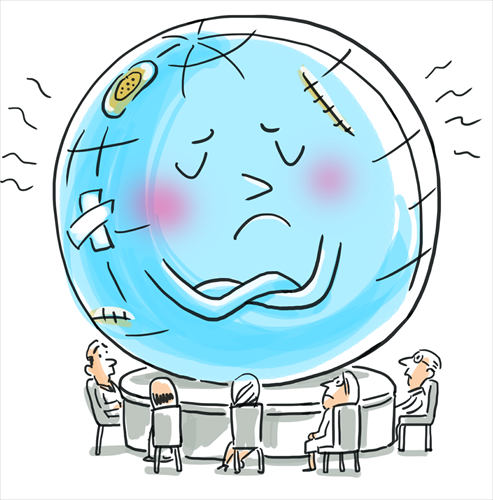Diverted priorities jeopardize G7 influence

Illustration: Liu Rui/GT
The G7 Ise-Shima Summit is a platform where the representatives of the developed world lay out their demands in international affairs. For decades, it has been playing an important role in boosting dialogues among the most developed economies. However, the grouping seems a bit inept in addressing many emerging problems, including the global economic slowdown, the escalating non-traditional security threats, the EU's feeble recovery and migrant crisis.
Although they are supposed to speak in one voice, G7 members have different motives for the summit. It is hard for them to reach a consensus on many questions, such as which way is better for sustainable economic growth: stimulus through fiscal and monetary policies or reform of the economic structure. Yet, the G7, a bloc comprising developed countries, has common views about certain affairs.
Europe will be more pragmatic in the future. Given the weak global economy, the European debt crisis, the predicaments of European integration and the inflow of migrants, Europe will have to face a more difficult situation than before. Under such circumstance, the EU has decided to go beyond its traditional conservatism and seek multiple partners to expand cooperation.
For example, in the framework of the G20, the EU has agreed with the proposals of emerging economies to reform the outdated International Monetary Fund. It has actively responded to China's "Belt and Road" initiative, and many European countries have enrolled in the China-led Asian Infrastructure Investment Bank. In the last few years, emerging countries have sustained stronger economic growth than developed countries, and become increasingly active in global affairs. This has transformed the EU's understanding of the world's future trajectory.
While befriending more countries, the EU is trying to avoid being marginalized in global affairs. The EU's say in international governance has been much weakened, for instance in promoting WTO and climate negotiation. Thus, in order to regain more initiative in setting agendas, the EU will continue laying the emphasis on its traditional alliance and be more active in a US-led "re-globalization."
In this way, when ramping up its relations with emerging countries in every aspect, the EU will not ignore forming a consensus with the rest of the Western world under traditional frameworks such as the G7, and so the EU's influence will be magnified in many other platforms such as the G20.
Uniting with the G7 on global economic, political and security issues, the EU aims to have a bigger say in agenda setting. Besides, by bonding emerging countries as well as reinforcing its traditional alliance with the rest of the developed world, the EU can strike a balance and maximize its interests.
Like the G20, the G7 should re-focus its attention on global economic issues and international governance. This is the wisest choice for the G7. The development from the G7 to the G20 indicates the fact that the world requires a more inclusive global order. The G20 incorporates most major developed and developing countries, which makes the grouping more legitimate and representative in solving global issues.
Over global issues, the G7 should conduct more dialogue with the emerging countries of G20, the 11 emerging countries known as E11, in which way their plans can be more concertedly beneficial to the international community. After discussing these issues within their own groups, the G7 and the E11 can bring their ideas for broader talks under bigger frameworks, which will increase the efficiency of dialogue. If both sides can achieve positive interaction, it will also be in line with the long-term interests of the developed world. Thus, some countries diverting the priority of the G7 agenda to territorial disputes in the South China Sea will only end up jeopardizing the G7's influence and legitimacy.
The author is a researcher at the Institute of World Economics and Politics, Chinese Academy of Social Sciences. opinion@globaltimes.com.cn Follow us on Twitter @GTopinion